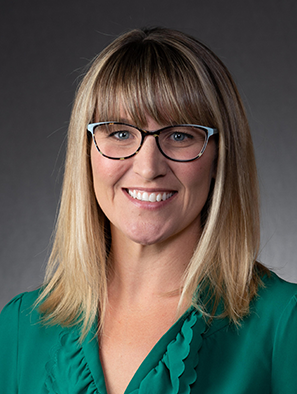
Robin Tinghitella
Associate Professor; Associate Chair
303-871-3658 (Office)
http://tinghitellalab.weebly.com
Boettcher Center West, 2050 E. Iliff Ave. Denver, CO 80208
What I do
I lead a research group at the University of Denver conducting basic and applied research to elucidate how animal behavior is shaped by evolution and responds to environmental change.Specialization(s)
ecology, evolution, behavior
Professional Biography
As a behavioral ecologist, I work to understand how rapidly changing environments alter animal communication, particularly interactions between males and females. Researchers in my animal behavior lab use both insect and fish model systems and are supported by the National Science Foundation, the Morris Animal Foundation, the Society for the Study of Evolution, and the Animal Behavior Society (amongst others). I graduated from the University of Portland with a B.S. in Biology before earning my Ph.D. in Evolution, Ecology, and Organismal Biology at the University of California, where I studied the evolution of animal communication and social interactions. I then completed postdoctoral positions at the University of Michigan and Michigan State University (MSU). At MSU I led a National Science Foundation funded project linking ecology graduate students with K-12 teachers and students to improve the scientists’ teaching and communication skills. The experience ignited a long-lasting passion for science education and science communication.
Degree(s)
- Ph.D., Evolution, Ecology & Organismal Biology, University of California, Riverside, 2008
- BS, Biology, University of Portland, 2002
Professional Affiliations
- American Association of University Women
- Animal Behavior Society
- Entomological Society of America
- International Society for Behavioral Ecology
- Society for the Study of Evolution
- The Orthopterists' Society
- Sigma Xi
Media Sources
Research
I am an evolutionary and behavioral ecologist. My lab works to understand the forces that shape diversity in animal communication and social systems. Some of our recent work has focused on how global change influences mating behavior and secondary sexual characteristics in natural populations. We use insect and vertebrate model systems and draw on expertise in field and laboratory behavioral studies as well as population genomic tools. Research interests include: sexual selection and mate choice, the evolution of novelty, conflict between natural and sexual selection, parental effects, sexual selection and speciation, experience-mediated phenotypic plasticity, and noise pollution. See our lab website for additional details: https://tinghitellalab.weebly.com. The University of Denver also has an active group of organismal biologists. Learn more about us at: https://dueeb.weebly.com.
Areas of Research
Behavioral ecology
Evolutionary Biology
sexual selection
animal communication
Global Change
science communication
Key Projects
- CAREER: Integrating contemporary evolution of animal communication in the field with science communication in our communities
- Immune and reproductive costs of human-generated noise
- RCN-UBE Incubator: Enhancing Undergraduate Biology Education through
Featured Publications
. (2018). Purring crickets: The evolution of a novel sexual signal. American Naturalist.
. (2018). Developmental experience with anthropogenic noise hinders adult mate location. Biology Letters.
. (2017). On the role of male competition in speciation: a review and research agenda. Behavioral Ecology .
Presentations
. (2019). Grand gestures and love notes: Animal communication in a changing world. University of California - Santa Barbara. University of California - Santa Barbara.
. (2019). Grand gestures and love notes: Animal communication in a changing world. University of California - Santa Barbara. University of California - Santa Barbara.
. (2019). Integrating the contemporary evolution of animal communication and science communication in our communities. Illinois State University. Normal, IL: Phi Sigma Biological Honor Society.
. (2020). Linking the contemporary evolution of animal communication and science communication in our communities. Department Seminar. Washington DC: George Washington University.
. (2019). How do new conversations begin? The evolution of a novel signal. Winter Animal Behavior Meeting. Steamboat, CO.
Awards
- Excellence in Service Award, University of Denver, Department of Biological Sciences
- Excellence in Teaching, University of Denver
- Faculty Career Champion, University of Denver
- Outstanding Junior Faculty Award, University of Denver, Department of Biological Sciences
- Warder Clyde Allee Award, Animal Behavior Society